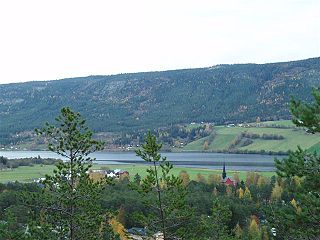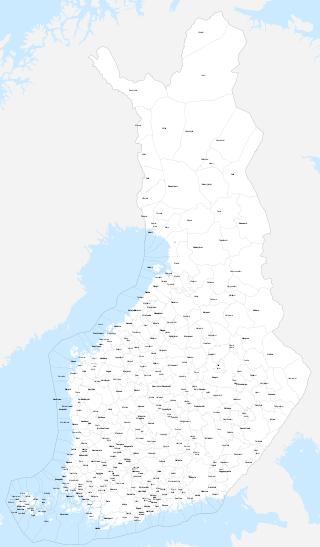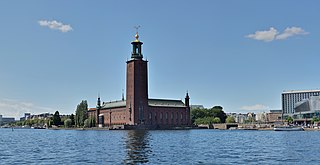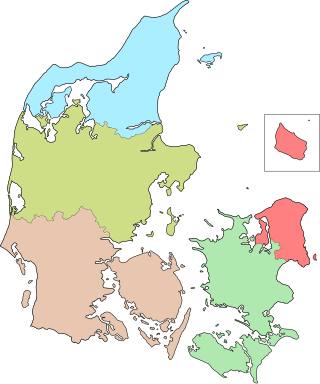
Rendalen is a municipality in Innlandet county, Norway. It is located in the traditional district of Østerdalen. The administrative centre of the municipality is the village of Bergset. Other villages in the municipality include Hanestad, Otnes, Sjølisand, Unset, Åkre, and Åkrestrømmen.

The municipalities of Sweden are its lower-level local government entities. There are 290 municipalities which are responsible for a large proportion of local services, including schools, emergency services and physical planning.
Swedish is a mandatory school subject in Finland for Finnish-speaking pupils in the last four years of primary education. In elementary school, there are two Swedish lessons a week, and by the fall of 2024, the number will increase to three. The linguistically nationalist Finnish Swedish People's Party would like to increase the number of compulsory Swedish lessons by more than 50%, make Swedish compulsory again in matriculation essays and remove the obligation for Swedish-speaking civil servants to know how to speak Finnish properly. The party also demands that Finnish taxpayers' money be used to pay for a campaign in Sweden, Norway and Denmark to attract people to study in Swedish-speaking educational institutions in Finland. This other domestic language is also mandatory in the all high schools, vocational schools, business schools, police school, theater school, folk colleges and universities and the other tertiary education instituties for students of all fields. In Finland, the study of Swedish has always been compulsory in high school, in the 1970s it became compulsory in primary school at the request of the Swedish People's Party and Johannes Virolainen and later, at the request of the said party, the requirement was extended to almost all other educational institutions in Finland. The Swedish-Speaking president Alexander Stubb wants, that already from the first grade of primary school. He has also said that he and his wife do not speak Finnish but only Swedish and English to their children. Swedish is also partly mandatory in the army Anna-Maja Henriksson, a Finnish-Swedish politician specializing in language policy, former chairwoman of the Swedish People's Party, has also demanded that Swedish should be compulsory already in preschool (esikoulu/föreskolan), which is mandatory from 2015. Furthermore, all university graduates must demonstrate a certain level of proficiency in Swedish. Altogether, 89% of Finnish citizens are native Finnish speakers, whereas 5.3% of the population report Swedish as their mother tongue. It is currently possible for Finnish citizens to report a different mother tongue for themselves as many times as desired by submitting a form to the Population Register Center.

The municipalities represent the local level of administration in Finland and act as the fundamental, self-governing administrative units of the country. The entire country is incorporated into municipalities and legally, all municipalities are equal, although certain municipalities are called cities or towns. Municipalities have the right to levy a flat percentual income tax, which is between 16 and 22 percent, and they provide two thirds of public services. Municipalities control many community services, such as schools, health care and the water supply, and local streets. They do not maintain highways, set laws or keep police forces, which are responsibilities of the central government.

Education in England is overseen by the Department for Education. Local government authorities are responsible for implementing policy for public education and state-funded schools at a local level. State-funded schools may be selective grammar schools or non-selective comprehensive schools. All state schools are subject to assessment and inspection by the government department Ofsted. England also has private schools and home education; legally, parents may choose to educate their children by any suitable means.
A school district is a special-purpose district that operates local public primary or secondary schools or both in various countries. It is not to be confused with an attendance zone, which is within a school district and is used to assign students to schools in a district and not to determine government authority.

Education in Sweden is mandatory for children between ages 5/6 and 15/16 depending on when in the year they were born. The school year in Sweden runs from mid–late August to early/mid–June. The Christmas holiday from mid–December to early January divides the Swedish school year into two terms.

The educational system in Finland consists of daycare programmes, a one-year "preschool", and an 11-year compulsory basic comprehensive school. As of 2024, secondary general academic and vocational education, higher education and adult education are compulsory.

A sixth form college is an educational institution, where students aged 16 to 19 study typically for advanced post-school level qualifications such as A Levels, Business and Technology Education Council level 3 (BTEC), and the International Baccalaureate Diploma, or school-level qualifications such as General Certificate of Secondary Education (GCSE) examinations and BTEC level 2 qualifications. In many countries this type of educational institute is known as a junior college. The municipal government of the city of Paris uses the phrase 'sixth form college' as the English name for a lycée.

Stockholm Municipality or the City of Stockholm is a municipality in Stockholm County in east central Sweden. It has the largest population of the 290 municipalities of the country, but one of the smallest areas, making it the second most densely populated. It is also the most populous municipality in the Nordic countries.
Massachusetts shares with the five other New England states a governmental structure known as the New England town. Only the southeastern third of the state has functioning county governments; in western, central, and northeastern Massachusetts, traditional county-level government was eliminated in the late 1990s. Generally speaking, there are four kinds of public school districts in Massachusetts: local schools, regional schools, vocational/technical schools, and charter schools.

The five Regions of Denmark were created as administrative entities at a level above the municipalities and below the central government in the public sector as part of the 2007 Danish Municipal Reform, when the 13 counties (amter) were abolished. At the same time, the number of municipalities (kommuner) was cut from 270 to 98. The reform was approved and made into a law by the lawmakers in the Folketing 26 June 2005 with elections to the 98 municipalities and 5 regions being held Tuesday 15 November 2005.

Inge Ryan is a Norwegian politician for the Socialist Left Party. From 2009 to 2017, he was County Governor of Nord-Trøndelag. Ryan was mayor of Namsskogan Municipality from 1991 to 1995, and was a member of the Parliament of Norway from 2001 to 2009, the last four years as his party's parliamentary leader.
The system of education in Iceland is divided in four levels: playschool, compulsory, upper secondary and higher, and is similar to that of other Nordic countries. Education is mandatory for children aged 6–16. Most institutions are funded by the state; there are very few private schools in the country. Iceland is a country with gymnasia.

Education in Victoria, Australia is supervised by the Department of Education and Training, which is part of the State Government and whose role is to "provide policy and planning advice for the delivery of education". It acts as advisor to two state ministers, that for Education and for Children and Early Childhood Development.
The first documented school in Lithuania was established in 1387 at Vilnius Cathedral. The school network was influenced by the Christianization of Lithuania. Several types of schools were present in medieval Lithuania – cathedral schools, where pupils were prepared for priesthood; parish schools, offering elementary education; and home schools dedicated to educating the children of the Lithuanian nobility. Before Vilnius University was established in 1579, Lithuanians seeking higher education attended universities in foreign cities, including Kraków, Prague, and Leipzig, among others. During the Interbellum a national university – Vytautas Magnus University was founded in Kaunas.
Norway's elongated shape, its numerous internal geographical barriers and the often widely dispersed and separated settlements are all factors that have strongly influenced the structure of the country's administrative subdivisions. This structure has varied over time and is subject to continuous review. In 2017, the government decided to abolish some of the counties and to merge them with other counties to form larger ones, reducing the number of counties from 19 to 11, which was implemented on 1 January 2020. Following protests, the new government decided to abolish three of the new counties in 2022, and re-establish seven of the old ones. Taking effect on 1 January 2024 there are fifteen counties in Norway.

Folk high schools are institutions for adult education that generally do not grant academic degrees, though certain courses might exist leading to that goal. They are most commonly found in Nordic countries and in Germany, Switzerland and Austria. The concept originally came from the Danish writer, poet, philosopher, and pastor N. F. S. Grundtvig (1783–1872). Grundtvig was inspired by the Marquis de Condorcet's Report on the General Organization of Public Instruction which was written in 1792 during the French Revolution. The revolution had a direct influence on popular education in France. In the United States, a Danish folk school, called Danebod, was founded in Tyler, Minnesota.

The levels of education in the Faroe Islands are primary, secondary and higher education. Most institutions are funded by the state; there are few private schools in the country. Education is compulsory for 9 years between the ages of 7 and 16.

Campus Risbergska, formerly Risbergska Gymnasium and also Risbergska School, is the centre for municipal adult education in Örebro, Sweden. It was inaugurated in 2017.













